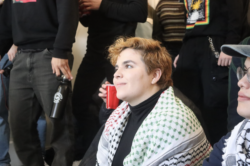Georgetown’s amateur filmakers are capturing District public schools through the eyes of the city’s immigrants this spring.
Students in Professor Elizabeth Stephen’s Immigrant Ethnography class are filming and producing their own short documentaries about immigration to the United States.
One group, led by producer Sara Burnes (SFS ‘08), is making a movie tentatively titled “Immigration: A Step Up or a Step Down?” about the educational opportunities—or lack thereof—available to immigrants in the District of Columbia public school system. The film focuses on students at several area schools, including Woodrow Wilson High School in Tenleytown and ABC Multilingual Charter School in Adams Morgan.
“What we’ve looked into is the discrepancy between the opportunities available to students in their home countries versus their experiences of higher education in America,” Burnes said.
Burnes and her fellow filmmakers, who are completing their interview footage this week and plan to have a rough cut finished by the time classes end, have faced logistical challenges on the way to seeing their movie reach the screen. On their first day at Wilson, none of the school administrators they talked to knew where the correct ESL classroom was, according to Stephen.
“Just to witness what an ESL class is like is a reality check,” Burnes said. “The teacher that we’ve been working with doesn’t even speak Spanish. She’s kind of removed from her own classroom.”
Hammad Hammad (SFS ‘08), another student who is working on the film, works with students at ABC Multilingual Charter School and has heard some stories over the course of the semester.
“One of the students walked with his family from El Salvador to the United States for a better life,” he said. “It took nine months, and they made it. The teachers told me he never misses school—out of guilt that he will not take advantage of the opportunity that his education could present.”
Hammad noted that making the film has presented philosophical challenges in addition to logistical ones.
“I think the toughest thing is trying to stay objective and not go into the documentary with a thesis that you are just trying to prove,” he said. “The documentary takes a lot of time and energy to put together, and sometimes interviews or filming [don’t] work out—so it can definitely get frustrating, but a great learning process.”
One factor that has mitigated the difficulties of the project is the extensive university support that the students have received. Both Burnes’ film and another documentary for Stephen’s class, produced by Andrew Cuan (SFS ‘08) about the proposed changes to immigration law, receive funding from Georgetown’s Center for New Designs in Learning and Scholarship.
“They’re looking for innovative learning models,” Stephen said, adding that the CNDLS was impressed by the students’ community-centered approach. “We’re not an isolated island. We’re part of the District of Columbia, and certainly immigration is a very timely topic, and there are so many immigrants in the DC area, and it’s a really great opportunity for the students to get hands-on ethnographic experience.”
Albert Wat, director of the DC Schools Project at Georgetown’s Center for Social Justice, was instrumental in getting the Georgetown students in touch with teachers and students in the D.C. public school system.
“Often, because they may not have the English skills, some of these kids may not feel like they have a way of expressing themselves or telling their stories,” he said. “And many of them have interesting stories to tell. This allows them to do that in a way that doesn’t necessarily rely on language.”
Although Burnes, Hammad, and the rest of the film crew have no plans to publicly show their film in the immediate future, they are hoping for it to eventually reach the entire Georgetown campus.
“I like to dream big, but I feel pretty reluctant to make any promises because we haven’t really pulled it together yet,” Burnes said.




